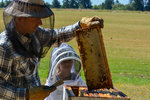
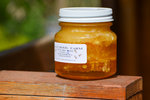

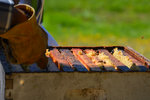
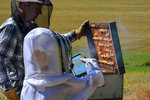
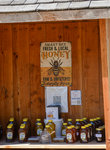
For millennia, humans have used honey from bees for medicinal purposes but now, consumers hope to naturally decrease allergies, soothe a sore throat or increase their antioxidant intake.
Although research studies have yet to prove that honey decreases the effects of seasonal allergies, Clark County beekeepers swear by it.
Honey can help soothe sore throats and coughs, as well as heal wounds because of its antibacterial and antifungal properties, according to the Mayo Clinic. Honey may even have anti-inflammatory effects.
Honey used in hospitals has been sterilized and inspected, while raw honey bought from local vendors usually isn’t.
“When I get that itchy feeling when I’m about to get a sore throat, all I do is eat a teaspoon of honey,” Smart Bee Pollination owner Viktor Plyushchev said.
Others add it to hot tea with lemon.
One allergy treatment, immunopathology, exposes a person to small doses of an allergen in hopes of causing the person’s body to react normally to it, according to the Mayo Clinic.
Specks of pollen, the same material causing allergies, are left in raw honey when it’s harvested out of honeycomb.
Half Moon Farm owner Brenda Calvert says that in order for the honey to be effective against allergies, the honey needs to be purchased from a beekeeper within 75 miles of the person’s home. The pollen specks in local honey are similar to the pollen that causes sneezing, runny noses and other allergy symptoms.
Calvert, who started keeping bees 16 years ago as a hobby with her husband Rob, said she believes wildflower honey works the best for helping with allergies. She also makes candles out of beeswax and lotions using honey as she cares for about 20 hives.
Many customers will purchase honey in April and will take a teaspoon of it every day for two weeks.
As a third-generation commercial beekeeper, Plyushchev learned how to care for bees from an early age. Throughout the years he witnessed health benefits from honey.
When his family moved to Oregon from Tajikistan, his father’s first job was working as a beekeeper. Plyushchev and his wife made their home in La Center around 2009.
He operates over 1,000 hives in 36 different locations around the county. The hives need to be spread out because bees travel up to three miles to collect pollen, Plyushchev said.
Those interested in beekeeping lend Plyushchev space on their property during the summer, without having to do the work of caring for them, he said.
Plyushchev harvests honey after certain plants or flowers bloom, such as maple, hawthorn and cascara trees, as well as blackberry bushes. The blooming season determines the flavor and color of the honey, he said
“It’s almost like wine tasting,” Plyushchev said. “Every flavor of honey is different.”
He said the honey won’t be made of pure maple or pure blackberry pollen because the bees will pick up other pollen as well.
“I personally think that all honey can be beneficial for allergies,” Plyushchev said.
He would previously sell the harvested honey to packers that would then be processed, bottled and sold in grocery stores around the state.
Packers mix honey from local beekeepers and pasteurize it. Plyushchev says the honey loses some pollen by the time it has been processed.
Now, he sells raw honey, bee pollen and honeycomb at a few local farmers markets and through a honey stand on the Smart Bee Pollination farm in La Center, 32110 NE 40th Ave.
Calvert said some store-bought honey will have additives, like high fructose corn syrup. She processes her honey by pouring it through a screen to collect unwanted wax chunks or other materials.
“I would definitely give honey a shot,” she said. “It’ll probably be the most painless for allergies.”
Research suggests avoiding feeding honey to children ages 1 year and younger because of the possibility of infant botulism, a serious form of food poisoning.